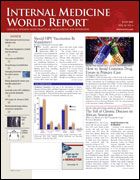NSAIDs in Cardiovascular Disease
Elliot Antman, MD
Can You Prescribe These Drugs Safely?
NEW ORLEANS—Some 30 million patients worldwide take nonsteroidal antiinflammatory drugs (NSAIDs) to treat pain and inflammation. In light of the cardiovascular (CV) and renal risks associated with these agents, can physicians safely prescribe these drugs to their patients? Experts at the American College of Cardiology annual meeting weighed in on this ongoing debate.
The spectrum of biological effects with NSAIDs depends on the specificity of cyclooxygenase (COX) inhibition. COX-1 inhibitors (traditional NSAIDs) can cause gastrointestinal (GI) toxicity but may have antithrombotic effects. COX-2 inhibitors, coxibs, may have less GI toxicity, but their prothrombotic potential differs among the individual coxibs, and possibly by dose and duration of use, said Debabrata Mukherjee, MD, FACC, of the Gill Heart Institute, University of Kentucky, Lexington.
BMJ
James Brophy, MD, PhD, of McGill University, Montreal, Quebec, Canada, has explored the postmarketing data to get to the truth about NSAIDs. In an important meta-analysis published last year (. 2006;332:1302-1308), the relative risk for vascular events with all COX-2 inhibitors was 42%, but differences among the agents were difficult to show, he said. "There are 121 randomized controlled trials," he notes, "but we still have outstanding questions."
Observational studies help fill this gap. The best studies all show increased CV risks (14%-80%) with rofecoxib (Vioxx), but are inconsistent for celecoxib (Celebrex), particularly in standard doses. Patients without previous myocardial infarction (MI) had a 23% increased risk with rofecoxib but no increased risk with celecoxib; however, in patients with previous MI, the risk increases by 59% with rofecoxib and by 40% with celecoxib, Dr Brophy noted.
Dr Mukherjee agrees. "The totality of the data suggests that celecoxib is not worse than the older NSAIDs, though there is a signal of cardiovascular risk at higher doses. But remember the black box warning is for all the coxibs. If you need an NSAID, naproxen [Aleve] may be the least toxic," he said, adding that naproxen may not be 100% safe either.
The Prospective Randomized Evaluation of Celecoxib Integrated Safety Versus Ibuprofen or Naproxen trial will assess the CV safety of 3 of the most common pain relievers. The study is currently enrolling patients with arthritis and either coronary heart disease (CHD) or risk factors for CHD.
Cardiac Patients Who Need NSAIDs
Elliott Antman, MD, of Brigham and Women's Hospital, Boston, prescribes NSAIDs only to patients at the lowest CV risk, in the lowest possible doses, using the lowest-risk agents and the shortest duration of treatment.
He said that "COX-2–selective NSAIDs should not be the first line but the last line of treatment today."
Dr Antman's stepped-care approach to using NSAIDs for musculoskeletal symptoms in patients with known CHD or with risk factors is to "begin with the least risky" and closely monitor patients. He starts with acetaminophen, aspirin, tramadol, or short-term narcotic analgesics (in patients with no substance abuse potential), or sometimes nonacetylated salicylates. If that is insufficient, he gives naproxen, then moves on if necessary to the COX-2–selective agents. For patients at increased risk for thrombotic events, he adds aspirin 81 mg/day with a proton pump inhibitor. He regularly monitors for hypertension, edema, renal function, and GI bleeding and reduces the dose or switches to alternative treatments if needed.
Dr Antman reminded physicians to discontinue NSAIDs in any patient with MI, since risk for death or MI increases by 29% with NSAID use.
Aspirin should not be given with ibuprofen, which may negate the protective effects of aspirin. If both drugs are necessary, ibuprofen should be given 8 hours ahead of aspirin, he said.
NSAIDs and the Kidney
Michael E. Farkouh, MD, director, Mt. Sinai Heart Clinical Trials Unit, New York City, emphasized that dose-dependent renal effects occur in up to 5% of patients after long-term use of NSAIDs.
Patients most at risk include those with an age-related decline in glomerular filtration rate, hypovolemia, loop diuretic use, heart failure, cirrhosis, and nephrosis.
Risk for acute renal failure with NSAIDs varies by agent, according to a recent epidemiologic study. Naproxen and rofecoxib carry the highest adjusted relative risk compared with nonexposure to NSAIDs (about 1.5-fold); risk with celecoxib is 1.5 and with meloxicam (Mobic) is nearly 1.3. Multiple studies have demonstrated that adverse renal effects with rofecoxib are dose-related. Much of the problem is linked to an aggravation of hypertension with NSAIDs; therefore, close blood pressure monitoring is mandatory.
A new COX-2 inhibitor that is not currently available in the United States, lumiracoxib (Novartis), shows an improved renal safety profile and a reduced association with heart failure, Dr Farkouh said.
